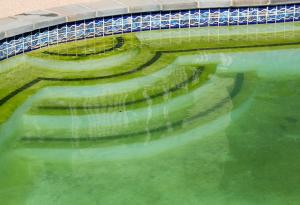Preventing Algae Growth in Pools During Louisiana’s Mild Winters
Algae can quickly take hold in pools during the winter when maintenance routines tend to lapse”
METAIRIE, LA, UNITED STATES, November 29, 2024 /EINPresswire.com/ -- Pools in Louisiana often remain active or semi-active during the mild winter months, creating unique challenges for pool owners. One of the most common issues during this time is the growth of algae, which thrives in the region’s warm and humid climate. William Gunzburg, owner of Kingfish Pools Inc. in Metairie, Louisiana, emphasizes the importance of proactive measures to prevent algae growth and maintain water quality during the winter season.— William Gunzburg
The Conditions for Winter Algae Growth
Algae growth in pools is influenced by several factors, including water temperature, sunlight exposure, and nutrient availability. In Louisiana’s mild winters, pool water rarely reaches temperatures cold enough to inhibit algae growth entirely. Combined with prolonged sunlight and organic debris from trees and shrubs, pools provide an ideal environment for algae to develop if left unmanaged.
“Algae can quickly take hold in pools during the winter when maintenance routines tend to lapse,” says Gunzburg. “Even when temperatures drop, the conditions in Louisiana make regular care essential.”
Winter is also a time when pool use typically decreases, leading to reduced filtration, circulation, and chemical adjustments. These changes can create stagnant water and imbalances in sanitizer levels, further encouraging algae growth.
The Importance of Preventing Algae Growth
Algae in pools not only detracts from the pool’s appearance but also creates health and safety risks. Algae makes pool surfaces slippery, increasing the likelihood of accidents. It can also clog filtration systems, reduce water quality, and make it more difficult to maintain proper chemical balance.
Addressing algae growth after it appears often requires more intensive cleaning, shock treatments, and chemical adjustments. Preventative care is key to avoiding these complications and ensuring the pool remains clean and functional throughout the winter months.
Preventative Steps for Winter Pool Care
Preventing algae growth in Louisiana pools during winter involves consistent maintenance and attention to water chemistry. Gunzburg recommends the following strategies to minimize algae risks:
1. Maintain Proper Water Chemistry
Balancing pool chemistry is the foundation of algae prevention. Keeping chlorine or other sanitizers at recommended levels ensures that algae spores are eliminated before they can take hold. Regularly testing and adjusting pH, alkalinity, and calcium hardness also helps maintain a stable and algae-resistant environment.
2. Run the Filtration System
Even during the off-season, running the filtration system for a few hours each day helps circulate water and prevent stagnation. Circulation is essential for distributing chemicals evenly and reducing areas where algae can thrive.
3. Clean the Pool Regularly
Removing debris such as leaves, twigs, and dirt from the pool surface and skimmer baskets is critical. Organic material introduces nutrients that feed algae, so regular cleaning minimizes these sources. Brushing pool walls and vacuuming the bottom further disrupt potential algae growth.
4. Use an Algaecide
Adding a winter algaecide as part of the seasonal maintenance routine provides an additional layer of protection. Algaecides target and inhibit algae at a microscopic level, making it more difficult for spores to colonize.
5. Cover the Pool
A high-quality pool cover blocks sunlight, one of the primary factors driving algae growth. Covers also prevent debris from entering the pool, reducing nutrient sources and the need for frequent cleaning.
Adapting to Louisiana’s Winter Climate
Louisiana’s unique winter climate requires pool owners to adapt their maintenance routines. Unlike colder regions, pools in Louisiana often do not require complete winterization. Instead, ongoing, moderate care is needed to address the specific risks posed by the state’s warmer temperatures and higher humidity.
The unpredictability of winter weather in Louisiana can also create challenges. A sudden warm spell can accelerate algae growth if preventative measures are not in place. Maintaining consistency in pool care, regardless of temperature fluctuations, is essential for keeping the pool in optimal condition.
The Role of Professional Pool Services
For pool owners who lack the time or expertise to manage winter maintenance, professional pool services can ensure algae prevention and overall pool care. Regular inspections, chemical adjustments, and cleaning by experienced technicians provide peace of mind and help prevent costly issues down the line.
Gunzburg stresses that consistent attention to pool maintenance during winter benefits pool owners year-round. “Winter care sets the foundation for easier spring openings and a healthier, more enjoyable pool season.”
Long-Term Benefits of Algae Prevention
Taking steps to prevent algae growth during Louisiana’s mild winters delivers long-term advantages. Clean, well-maintained pools require less time and money to prepare for spring and summer use. Proactive care also extends the lifespan of pool equipment and surfaces by reducing strain from chemical imbalances and algae removal efforts.
Addressing algae prevention during winter supports both the aesthetic appeal and functionality of the pool, ensuring that it remains a valuable feature of the property.
Morgan Thomas
Rhino Digital, LLC
+1 504-875-5036
email us here
Visit us on social media:
Facebook
Legal Disclaimer:
EIN Presswire provides this news content "as is" without warranty of any kind. We do not accept any responsibility or liability for the accuracy, content, images, videos, licenses, completeness, legality, or reliability of the information contained in this article. If you have any complaints or copyright issues related to this article, kindly contact the author above.


